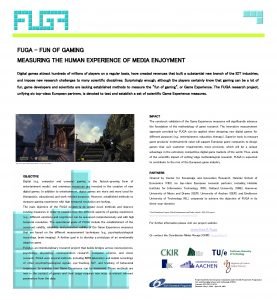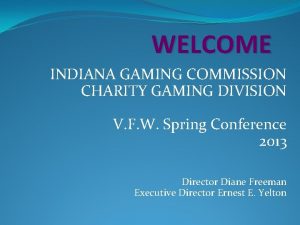FUGA FUN OF GAMING MEASURING THE HUMAN EXPERIENCE

- Slides: 1

FUGA – FUN OF GAMING MEASURING THE HUMAN EXPERIENCE OF MEDIA ENJOYMENT Digital games attract hundreds of millions of players on a regular basis, have created revenues that built a substantial new branch of the ICT industries, and impose new research challenges to many scientific disciplines. Surprisingly enough, although the players certainly know that gaming can be a lot of fun, game developers and scientists are lacking established methods to measure the “fun of gaming”, or Game Experience. The FUGA research project, unifying six top-class European partners, is devoted to test and establish a set of scientific Game Experience measures. IMPACT The construct validation of the Game Experience measures will significantly advance the foundation of the methodology of game research. The innovative measurement approach provided by FUGA can be applied when designing new digital games for different purposes (e. g. , entertainment, education, therapy). Superior tools to measure game products' entertainment value will support European game companies to design games that suit customer requirements most precisely, which will be a unique advantage in the extremely competitive digital game markets of the world. Thus, aside of the scientific impact of cutting-edge methodological research, FUGA is expected Elder Scrolls IV: Oblivion © Bethesda Softworks; Half life 2: Lost Coast © Valve Corporation to contribute to the rise of the European game industry. PARTNERS OBJECTIVE Digital (e. g. , computer and console) gaming is the fastest-growing form of entertainment media 1, and enormous resources are invested in the creation of new digital games. In addition to entertainment, digital games are more and more used for therapeutic, educational, and work-related purposes. However, established methods to measure gaming experience with high temporal resolution are lacking, . Chaired by Center for Knowledge and Innovation Research, Helsinki School of Economics (FIN), six top-class European research partners, including Helsinki Institute for Information Technology (FIN), Gotland University (SWE), Hannover University of Music and Drama (GER), University of Aachen (GER), and Eindhoven University of Technology (NL), cooperate to achieve the objective of FUGA in its three-year duration. The main objective of the FUGA project is to create novel methods and improve existing measures in order to examine how the different aspects of gaming experience (e. g. , different emotions and cognitions) can be assessed comprehensively and with high temporal resolution. The operational goals of FUGA include the establishment of the construct validity, reliability, and predictive validity of the Game Experience measures that are based on the different measurement techniques (e. g. , psychophysiological recordings, brain imaging). A further goal is to develop a prototype of an emotionally 1 Price. Waterhouse. Coopers Global Entertainment and Media Outlook: 2006 -2010 report http: //www. gamasutra. com/php-bin/news_index. php? story=9793 For further information please visit our project website: www. hse. fi/fuga Or contact the Coordinator Niklas Ravaja (CKIR): ravaja@hse. fi adaptive game. FUGA is an interdisciplinary research project that builds bridges across neurosciences, psychology, physiology, communication research, computer science, and vision research. FUGA uses several methods, including f. MRI, laboratory and mobile recordings of other psychophysiological signals, eye-tracking, IAT, and tracking of behavioral responses, to examine how Game Experience can be measured. These methods are new in the context of games and their usage requires new ways to extract relevant parameters from the data. Project funded by the European Commission under the 6 th Framework Programme: New and Emerging Science and Technology (NEST) Contract: FP 6 -NEST-28765 Duration: May 1, 2006 - April 30, 2009

